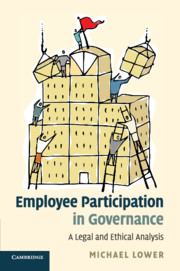Book contents
- Frontmatter
- Contents
- Acknowledgements
- Tables of legal instruments
- 1 Introduction
- 2 Catholic Social Thought: nature, sources and core principles and values
- 3 Catholic Social Thought and work
- 4 Catholic Social Thought, private property and markets
- 5 The corporation
- 6 The firm and society
- 7 Employee participation in corporate governance: an ethical analysis
- 8 Corporate Governance in the United Kingdom
- 9 Labour law and employee participation
- 10 Employee participation and EU corporate governance
- 11 Conclusion
- Bibliography
- Index
4 - Catholic Social Thought, private property and markets
Published online by Cambridge University Press: 05 October 2010
- Frontmatter
- Contents
- Acknowledgements
- Tables of legal instruments
- 1 Introduction
- 2 Catholic Social Thought: nature, sources and core principles and values
- 3 Catholic Social Thought and work
- 4 Catholic Social Thought, private property and markets
- 5 The corporation
- 6 The firm and society
- 7 Employee participation in corporate governance: an ethical analysis
- 8 Corporate Governance in the United Kingdom
- 9 Labour law and employee participation
- 10 Employee participation and EU corporate governance
- 11 Conclusion
- Bibliography
- Index
Summary
Introduction
The social question confronted by Rerum novarum was the conflict between capital and labour. Leo XIII's response combined a vigorous defence of the human rights of the worker with an insistence on the natural right to property ownership. It would be superficial (to say the least) to imagine that this was an attempt to strike a political balance between left and right. It would be equally superficial to imagine that the Pope saw this as a defence of two unrelated sets of rights that happened to have come into conflict. Rather, he saw work and private property as being mutually complementary. Substituting state for private ownership would both harm the worker and distort the role of the state. Private property ownership is (for most people) an indispensable precondition for fulfilling work and for being able to bring rationality and free will to bear on planning their own lives and providing for their families. This chapter outlines what CST has to say about the right to private property ownership. It also examines the roles of the state, markets and of actors such as representatives of capital and labour in a soundly-functioning economy and society.
Private property and human dignity
CST sees the right to own private property as a natural right that plays a crucial role in the development of the human personality. It is closely linked to work and to freedom.
- Type
- Chapter
- Information
- Employee Participation in GovernanceA Legal and Ethical Analysis, pp. 50 - 57Publisher: Cambridge University PressPrint publication year: 2010



